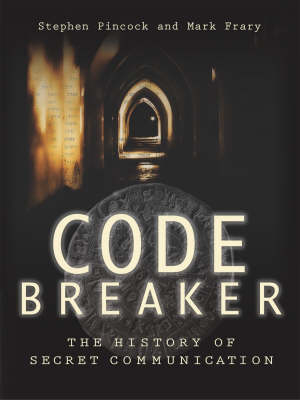
Codebreaker
Random House Books (Verlag)
978-1-905211-54-8 (ISBN)
- Titel ist leider vergriffen;
keine Neuauflage - Artikel merken
From the Bible code to the Voynich manuscript, from subtly altered hieroglyphs carved into ancient Egyptian monuments to clues hidden in Renaissance paintings, we are surrounded by mysterious codes bearing hidden messages from the past. Can ingenuity and perseverance enable us to crack them? What does it take to write a fail-safe code? What does it take to break one? Taking in the full history of codemaking, from the scribes of ancient Egypt to modern day computer programmers, "Codebreaker" provides a fascinating insight into this most secret and mysterious of crafts. It shows just how Julius Caesar cunningly obscured the meaning of vital wartime messages and explains that Sir Francis Walsingham - the founder of England's first secret service - used coded letters to foil plots against Elizabeth I. It gives an account of the ever more complicated ciphers that were devised - and cracked - during the Cold War and investigates how codebreaking is being used today to fight crime and terrorism. And it shows you how to decipher codes from all periods of history, including many that are still employed today.
If you want to pit your wits against famously unbroken codes like the Dorabella or the Beale Ciphers, discover more about the Navajo windtalkers of World War Two or simply get a taste of the long and distinguished history of the codemakers' craft, "Codebreaker" is a fascinating - and enlightening - guide.
Stephen Pincock is news editor for The Scientist magazine, a science columnist for the Financial Times magazine and a regular contributor to The Lancet. A trained biochemist and science journalist, Stephen is fascinated with deciphering codes and has a passionate interest in the history of espionage. He has written widely about the history and development of cryptology, technology and science, from unravelling the secret codes of DNA to understanding the secrets of The Da Vinci Code. Mark Frary is a UK-based technology and science writer and his work has appeared in the Times and a range of other newspapers, magazines and online publications. Before becoming a writer, Mark trained as an astrophysicist and went on to investigate the origins of the Universe at the CERN nuclear physics laboratory in Geneva. He has had a lifelong interest in codes and codebreaking, particularly in the applications of quantum cryptography. He lives close to the Second World War codebreaking centre of Bletchley Park in Bedfordshire, where he is a regular visitor.
| Erscheint lt. Verlag | 1.2.2007 |
|---|---|
| Zusatzinfo | Throughout |
| Verlagsort | London |
| Sprache | englisch |
| Maße | 173 x 229 mm |
| Gewicht | 625 g |
| Themenwelt | Geschichte ► Teilgebiete der Geschichte ► Kulturgeschichte |
| Informatik ► Theorie / Studium ► Kryptologie | |
| ISBN-10 | 1-905211-54-6 / 1905211546 |
| ISBN-13 | 978-1-905211-54-8 / 9781905211548 |
| Zustand | Neuware |
| Haben Sie eine Frage zum Produkt? |
aus dem Bereich


